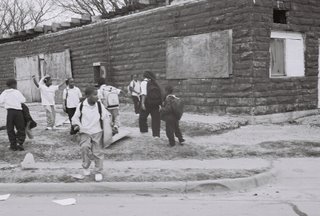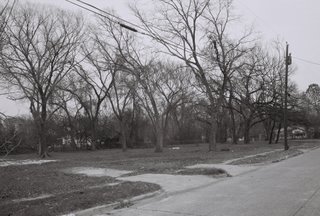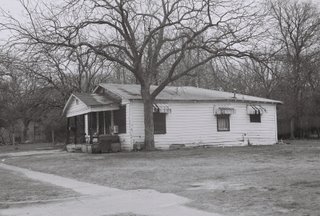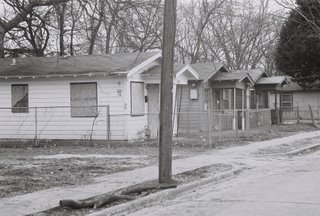
Talk all you want to about "personal responsibility" and taking advantage of opportunities that come your way, but if you are a child and your neighborhood looks like this and operates in a totally dysfunctional manner largely due to its infrastructure failings, what real chance do you have of moving forward in any truly productive manner?
I took these photos in one of the South Dallas neighborhoods where we work every day.

Three realities are very, very clear here.
First, with a few rare exceptions and excluding the Habitat homes, the majority of the housing stock is in terrible disrepair. Much of it is uninhabitable, even though folks are trying to make homes in some of these structures.
Second, vacant lots where homes once stood are everywhere. In one section of this neighborhood many contiguous lots form large open spaces that
 are ripe for new development, but for the horrible surrounding properties.
are ripe for new development, but for the horrible surrounding properties.
Third, when a neighborhood "tips over" like this to the negative side of the ledger, nothing will change until public policy solutions are agreed upon and implemented. Only a major commitment from the public institutions of our larger community will allow this community to live again.
 The City of Dallas should be ashamed to continue to carry this "housing" in its community portfolio. The City should muster the political and economic will to bring this area back. Such a move will involve the investment of millions of dollars in mortgage assistance funding and in infrastructure improvements and developers' incentives.
The City of Dallas should be ashamed to continue to carry this "housing" in its community portfolio. The City should muster the political and economic will to bring this area back. Such a move will involve the investment of millions of dollars in mortgage assistance funding and in infrastructure improvements and developers' incentives.While the cost will be high, the price of doing nothing will turn out to be much more expensive in terms of human loss--crime, delinquency, deteriorating health, educational failures and dropouts and environmental impact.

The City has ignored this neighborhood long enough.
Take a look again.
Can you believe this is Dallas, Texas, the "can do" city?
Sadly it is.
We can do better than this.
Surely we can.


Larry, this comment isn't about the housing specifically, but I read someplace (I think on another board I frequent) that during the recent ice storm, the Dallas city schools were open . . . because 80% of the kids that went there depended on the schools for their food.
ReplyDeleteI did not realize that the situation for the poor in Dallas was THAT bad.
That's also shameful. But here I am criticizing from my safe haven in Atlanta. I'd rather do something.
Potatoes and dried beans are cheap. The parents should be held responsible. I grew up as the child of a tenant farmer. The houses we lived in didn't look any better than some of these. But you know what? My parents made them real cozy. One can rise aboce his circumstances.
ReplyDeleteAnonymous, your comment is amazing to me. You assume so much here. Question for you: in what year were you born? where were you born? in what ways do you feel cities may be different from rural settings? what is your ethnic background?
ReplyDeleteThese details matter, a lot.
When you are at the bottom of the barrel, trying to claw your way out, it takes soooo little to knock you back down. I do not know anyone who hasn't made some major mistakes in life. For some of us it kocks us down to the bottom. For others, there is support in place that keeps us from falling too far. If we haven't fallen to the bottom, let's be cautious about judging those who have ... there but for the grace of God is your life. It is easy to pretend this is not true.
ReplyDeleteLarry, your questions were probably retorical but I will answer anyway. I was born in 1937 in the Missouri Bootheel. We didn't have indoor plumbing until I was in college. I graduated from Columbia University Teachers College and my brother is a nuclear scientist. My mon died when I was just out of high school and my dad was too poor to send us to college.
ReplyDeleteI am part of a group who will soon work in a poor section of our city. I will keep you informed how it goes. I believe the first thing on the agenda is to help clean up the area as it looks like a garbage dump. They don't put their trash in garbage cans for some reason and dogs rip them open.
Anonymous, my questions were not rhetorical at all. I find it interesting that you didn't answer all of my questions.
ReplyDeleteI beg you to reconsider such a move or any work among the poor unless you are willing to do two things. 1) Get to know the people by asking quesitons and listening about 10 times more than you talk. 2) Resolve not to preach--the people there don't need your words, they need your understanding and your commitment to them personally. You are too full of preconceived ideas and judgment to do anyone any good. Sorry if I sound harsh, but the people you are "targeting" don't need what it appears to me you intend to bring to them.
If you intend to go to them, move in to the neighborhood and just keep your ears open for about a year. Find the leaders and let them teach you. If you are going on "mission," be open to the real possibility that the people already know more about Jesus than you do.
I realize I am way out on a limb here and I may be making judgments and assumptions that are way off base. If so, straighten me out.
I didn't intentionally omit a couple of questions. My family on both sides came from England in the 17th century. Living on a cotton farm was very difficult. One did not have a regular salary and one big rain or drought could wipe you out. On the other hand one could grow a lot of food and summers were busy canning produce for the winter. It's not a life I would recommend.
ReplyDeleteAnonymous...I really don't know what to say. I agree completely with Larry.
ReplyDeleteI would suggest reading Paulo Freire's Pedagogy of the Oppressed. It offers great insight.
Some quotes:
"...true solidarity with the oppressed means fighting at their side to transform the objective reality...The oppressor is solidary with the oppressed only when he stops regarding the oppressed as an abstract category and sees them as persons who have been unjustly dealt with, deprived of their voice, cheated in the sale of their labor--when he stops making pious, sentimental, and individualistic gestures and risks an act of love." (pp. 31-32)
"The man or woman who proclaims devotion to the cause of liberation yet is unable to enter into communion with the people, whom he or she continues to regard as totally ignorant, is grievously self-decieved." (p. 43)
"Only through comradeship with the oppressed can the converts understand their characteristic ways of living and behaving, which in diverse moments reflect the structure of domination." (p. 43)
"It is not our role to speak to the people about our own view of the world, nor to attempt to impose that view on them, but rather to dialogue with the people about their view and ours." (p. 77)
Things like this will be addresses come next council. A lot of the Councilpeople that ignore what you see will be gone, and new people that actually care will be replaced and team up with folks currently on the council that actually care about this sort of thing.
ReplyDelete